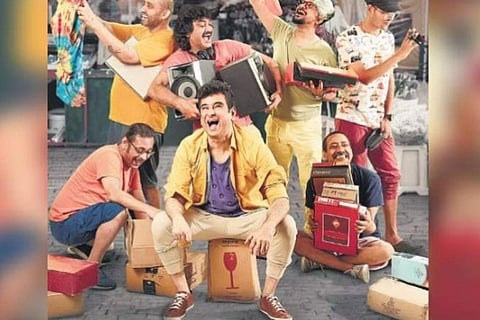
- LIFESTYLE
- FASHION
- FOOD
- ENTERTAINMENT
- EVENTS
- CULTURE
- VIDEOS
- WEB STORIES
- GALLERIES
- GADGETS
- CAR & BIKE
- SOCIETY
- TRAVEL
- NORTH EAST
- INDULGE CONNECT

It’s been over two decades since Euphoria released Maaeri, but the romantic number still gets the crowd grooving like it’s topping the charts today. This is validation enough for the Dr Palash Sen-led band to embark on a national tour to mark its 25th anniversary. “People measure success with money. I measure it with relevance,” says the singer, who is an orthopedic surgeon based in Delhi. Sen adds, “We were everyday middle-class guys singing songs about, and for, the average person.” The tour will open on December 9 with a show in Indore, followed by Jaipur, Bengaluru, Gurugram, Lucknow, Kolkata and Mumbai.
Euphoria, founded in 1998 by Sen, became a household name with its first album, Dhoom. Never restricted by genre, language or theme, the band made peppy foot-tapping numbers as well as songs on heartbreak, all of which would often come together in a tune like Kaise Bhulegi Mera Naam. “I think we became popular because we changed our language.
We started rock in Hindi,” says Sen, elaborating that the idea was borrowed from the band culture of Bengal, which introduced the region to Bangla rock. What made Euphoria a national phenomenon though was how their Hindi songs imbibed elements from cultures across the country. So if a Maaeri has Punjabi bol, Dhoom Pichuk has couplets from Bengali baul, and Khwamakhaa opens with Tamil rhymes.
Euphoria is said to be rooted in English rock. A close listen to their seven albums and 16 singles, however, reveals hints of Jazz, think trombones; R&B and Pop, think drums; and even metal music. A visit to Sen’s studio in Delhi’s Greater Kailash is proof of the influences. Images of Led Zeppelin and Elvis Presley to Deep Purple and AC/DC adorn the walls. “You have to keep reinventing yourself. We are experimental, not just with the songs we make, but also what we listen to,” informs Sen.
He adds that old Hindi songs, classical music, qawwali and ghazals are also part of Euphoria’s jukebox, which explains the Indianisation of Western beats with indigenous instruments, taals and ragas. Tabla, dholak and flute harmonise with drums and guitar. The song, Hum, begins with a taal, before the roll of drums intermingles to create desi Rock n Roll.
Bands are historically associated with establishing counterculture. The Beatles did it in the West, so did Pink Floyd and The Rolling Stones. In Bengal, there was Moheener Ghoraguli in the 1970s, who sang about brave new worlds. Euphoria has carried on the tradition. Their 2011 album, Item, for instance, spoke about Bollywood’s obsession with “item numbers” and the objectification of women. “The artist’s voice must be the loudest in the society. If we don’t do it, who will?”